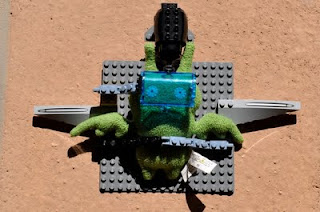.
In 2002, she published a retelling
The Princess and the Pea: A Very Short Pop-up (Simon & Schuster) and her Young Adult Novel
Head Case (Roaring Brook Press, 2007) was a 2008 Quick Pick for Reluctant readers. She lives in Hanover, NH with her husband and son and looks forward to visits from her daughter, step-son and step-daughter when they get breaks from their college and military schedules.
When she’s not writing you can find her cooking in the kitchen, dipping her toes in Quechee Gorge and watching football on Sunday’s. Today, I’m honored that she’s here to talk to us about her new Middle Grade novel
Beyond Lucky (Dial Books) which in my opinion is beyond incredible. Welcome, Sarah!!
When and why did you decide to become a writer? If you weren’t a writer, what career might you have chosen?
My writing life began in 2000, when I decided to “retire” from my job as a physical therapist. Up until then, I had worked in a variety of clinical settings, and I’d probably still be doing that if I hadn’t moved to Hanover, NH. In Hanover, after teaching a spinning class (the biking kind), someone dared me to try writing. Since I was nursing a sore back, I thought, “Why not?” Since I had kids and I read to them a lot, I started with picture books.
What was the inspiration behind Beyond Lucky? Did the characters or plot come first?
My first goal was to write a book about a quirky town full of quirky people—a middle grade Garp. But I quickly found out, I was no John Irving! At the time, my son, Elliot, was playing rec soccer. (He was a daisy picker—not really into it.) It gave me time to check out the soccer community. Let’s just say: I had LOTS of material to work with!
What was the timeline it took you to finish the novel? What were the biggest challenges along the way?
I put this book away for a LONG time. When I returned to it, I changed everything: including the POV and many of the events. Interesting, what I think really made this book come alive were the Presidents. My son, Elliot (the daisy picker), LOVES studying the Presidents. One day, he was in a really bad mood. I looked at his reading material. He was reading about Gerald Ford. I thought this was so funny, I made Ari a Presidential fanatic, too. After that, something clicked. But perhaps the BIGGEST challenge was Mac. He had to be realistic and likeable.
Your protagonist Ari is a thirteen-year-old boy. Was it difficult to find his voice and make him authentic? To make him quirky and relatable to readers? Can you talk about your character development process?
I am a bit superstitious. And as I said above, the Presidents definitely helped. While I was working on this book, my stepson, Ed, was serving in the US Army. He got through Ranger Training and then was deployed to Afghanistan. (He is home and safe now!) So I KNEW Ari’s and his family’s fear for Sam.
Did you know the obstacles that were going to stand in Ari’s way when you began the novel or did they develop through the revision process? There’s a balance of inner and outer conflict, yes?
For a while, Sam was a dead sister. For a while, Parker was a boy. There used to be an entire mayoral race. Being willing to re-imagine my characters and plot helped me find the best story possible. It may not be the fastest method, but there’s nothing worse than sticking with things that aren’t upping the tension.
Many writers talk about the problem with a sagging middle, this isn’t the case in your novel. How did you decide which scenes to cut? Completely rewrite? Or just scale back? Did you look at each individual chapter? The novel as a whole?
The story board is my best friend.
I make a box for EACH scene. I write down the main action and main emotion. If the actions are “to be” actions, I re-imagine. (So he can’t just change his mind or worry.) If the emotions are too similar, I go back to work. I even draw pictures of the scene. That really helps me see if I am missing something.
This may seem labor intensive, but if a chapter is not working, I revise it in a wider lens POV. So I can see what my character does not see. It hasn’t failed me yet!
Your dialog in the story is realistic, moves the story forward and reveals character? Why do you think some writers struggle with dialog? How do you keep your dialog real?
Dialog is a funny thing. It can’t be too natural—as Tim Wynne-Jones told me, it has to be what the character would have said if they’d had twenty extra seconds to prepare the reply. But it can’t be TOO purposeful. (Banish the info dump!!!) I LOVE writing dialog because I love reading it. As a kid, I hated reading, and I’d always jump to the places with white space. I also read a lot of plays. When I read a sagging bit of dialog, I suspect that the writer isn’t trusting the reader entirely.
As you’re also an instructor for children’s writers through
Writers on the Net (I highly recommend Sarah as I’ve taken one of her classes!), can you talk about your decision to teach and how you strike a balance between your writing and mentoring? Do you learn just as much from your students as they learn from you?
I learn SO MUCH teaching classes. I LOVE talking about craft. And I think that most writers become better writers when they are actively reading and critiquing as well as writing. I definitely benefit from the balance. The writers.com community is so supportive. Right now, I’m wrapping up a whole novel class. The writers in this group have inspired me all summer. It is humbling for me to help them develop their novels. (I think there are only a few spaces left for the Manuscript Review Class this September!!)
What do you think is the hardest thing for young writers to develop: consistency, perseverance, patience and/or skills? What advice can you pass on to them?
Perseverance and a willingness to fail. I wrote about this on the Mixed Up Files of Middle Grade Authors blog. When people hear that I followed Cynthia Leitich Smith’s lead and deleted this entire manuscript (Yes I did), they gasp. But for me, it was liberating. (and scary) I knew I had some good ideas, but I didn’t want to hold onto the wrong words.
What are you working on now? Any projects in the desk drawer that you’ll be dusting off and revisiting?
I am ALMOST done with a YA novel called BELIEVE. Next I am going to plunge into a companion novel for Beyond Lucky, from Parker’s POV. I have two half-finished YA’s waiting their turn.
Can you name one craft book you return to when you’re stuck or need inspiration and why?
One? You’re killing me!
Right now, my go-to craft book is Donald Maass’ THE FIRE IN FICTION.
Tell us 3 things you can’t live without.
Coffee
Bikram Yoga
My fabulous family
Cut and paste (I would never have been a writer without WORD.)
Tell us 3 things you wish were never invented.
Partisan Politics
SAT’s
Penalty kicks to end a championship
Beyond Lucky's Book Trailer!!!
Giveaway!!
There are three copies of Sarah's Beyond Lucky to be won!!! Are you feeling lucky? Sure, you are!! Enter for a chance to win an autographed copy of Beyond Lucky. Comment on this post and supply your email address (format: carmen at carmenoliver dot com). Deadline is Aug 5th, 2011. Giveaway is open to US and Canada readers. Author-sponsored. Good luck!
Thanks, Sarah!


















